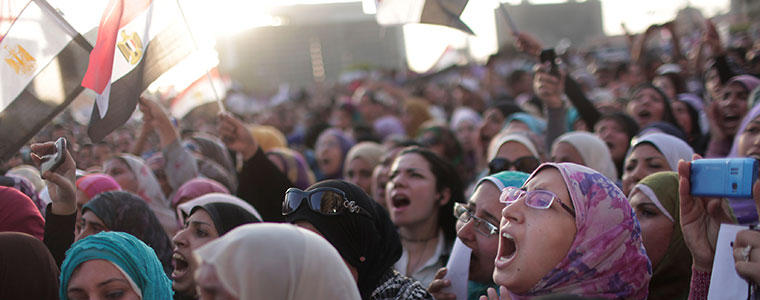The fledgling new governments in Egypt, Tunisia and Morocco are now facing persistent challenges from a different kind of unrest - labor strikes. In all three countries, hundreds of strikes have repeatedly disrupted government services and private industries since the Arab uprisings erupted in January 2011.

Labor unrest long predates the political upheavals, but strikers have been emboldened by the success of political protests and eroding economic conditions. Unions have emerged as the most organized political force outside the Islamist parties that have won elections in all three countries since last October.
Strikes both large and small represent a particular dilemma for the Islamists' economic agendas. Islamist parties-Ennadha in Tunisia, both the Muslim Brotherhood and the Salafi Nour party in Egypt, and the Justice and Development Party in Morocco-have pledged to provide "social justice" but also to jumpstart stagnant economies through reforms. The dual goals already often conflict, with strikes complicating the stability needed for economic development.
Tunisia has witnessed strikes by doctors, police and security force officers, postal workers and social security employees as well as in industries like the state-owned soft drink and beer company. In February 2012, municipal workers launched a four-day national strike to demand wage increases. In May, a key sector of Tunisia's economy was paralyzed when hundreds of job-seekers occupied the headquarters of major phosphate mine in Gafsa.
In Egypt, more than 1,300 strikes have deepened the sense of economic uncertainty across the country since the ouster of President Hosni Mubarak in January 2011. Labor strikes have mobilized pharmacists, pensioners, lawyers, railway workers, doctors, journalists, students and, in an ironic twist, the police once charged with putting down protests. Most of their initial demands were for better pay or more jobs.
Sporadic strikes have impacted key parts of Egypt's economy, from tourism to gold mining and oil production. In April 2012, striking airport freight workers blockaded the road to Luxor International Airport from tourist traffic, while striking hotel workers obstructed popular tourist hotels and visitor sites in Hurghada. A strike by public transportation worked halted all bus traffic in Cairo for two days in March 2011.
In Morocco, strikes became so frequent in 2011 that the North African country reportedly averaged almost one strike a day-tripling the number of lost working days in 2010. In April 2012, the Islamist-led government even considered new legislation to regulate strikes-over fierce objections from unions. The proposed law would require unions to negotiate with employers before launching a strike-or face tough financial penalties.
The strikes come amid deteriorating economic conditions in all three countries. In Tunisia, unemployment spiked from 13 percent in 2010 to 19 percent in 2011, while gross domestic product contracted after more than 170 foreign companies closed up shop. Tens of thousands have fled the country to find jobs in Europe.
In Egypt, nearly one million have lost their jobs due to plummeting tourism, capital flight and a virtual freeze of private investment. The official unemployment rate shot up to over 12 percent, the highest in two decades. One in four young people were reportedly jobless in 2012.
Morocco avoided the ouster of a government, partly through reforms strengthening parliament's powers. But the kingdom has nonetheless faced waves of political protests and labor unrest. A crop-crippling drought and the spillover of Europe's economic crisis have exacerbated a drop in tourism and unemployment woes, especially among the young.
In early 2012, one-third of young Moroccans under the age of 34 were unemployed, including 16 percent of university graduates. On the one-year anniversary of the Arab uprisings in January 2012, five Moroccans set themselves on fire in front of a government ministry in Rabat to protest unemployment. All five were college graduates.
In all three North African countries, strikes have tapped into wider discontent to win public support. And economic recovery is expected to take years in countries that have witnessed uprisings-in a region that already seriously lags behind growth and modernization from most other parts of the world. As a result, labor movements and strikes may well prove an ongoing problem-and potentially growing issue-for the new Islamist-led governments.
This piece also appears on "The Islamists Are Coming" site.